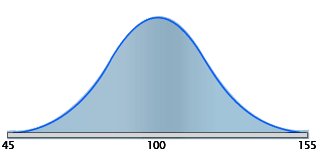|
summary
intro
graphs
detailed results
strengths & limitations
advice
|
Overall Score
(score: 91)
Overall capacity to deal with emotions and emotional situations.
|
Sam's score on this assessment is reasonably good, but there is some room for improvement. Overall, he is reasonably skilled at understanding and dealing with emotions. Emotional intelligence is not only essential to healthy relationships with others, research has also shown that a healthy EQ contributes to problem-solving ability, leadership ability, goal achievement, and professional success in general. Review the rest of Sam's results to know which areas he needs to work on developing the most - awareness is key to helping him find the motivation to improve.
|
Emotional Competencies
(score: 59)
Traits and skills that are essential to dealing with Sam's own as well as other people's emotions.
|
The emotional competency aspect of the assessment reflects an understanding that as humans, we are emotional beings. An emotionally intelligent person is open to understanding his or her feelings, and can identify and deal with other people's feelings, both pleasant and unpleasant, with finesse. Most importantly, he/she is able to achieve a healthy balance between emotional suppression and unbridled emotional expression.
The following is a breakdown of Sam's emotional competencies:
Dealing with his own as well as other people's emotions is not a pleasant experience for Sam. He would rather just avoid the topic of feelings entirely. While he has the ability to identify emotions in himself, Sam is not quite comfortable expressing them. This could be for a number of reasons. It may be that he doesn't have the skills to express his emotions and therefore, is not sure how to be put them into words. The case could also be that he is accustomed to being in an environment where emotional expression is discouraged. Talking about his feelings also requires a degree of vulnerability that he may not be comfortable with. The more his your emotions, the more difficult it is for Sam to maintain a positive mindset. When he allows his emotions to get out of control, his thoughts soon follow, resulting in a downward spiral into more negativity. Sam has the ability to recognize his emotions based solely on the physiological signals from his body. Even when he is overwhelmed by different emotions, he is able to step back from the situation and objectively analyze his feelings. Sam takes the time to reflect on his emotions. He "feels" his way through a situation and allow his emotions to guide him. When his gut instinct or intuition offers him a warning, Sam listen to and trust the information. When faced with difficult or emotionally charged situations, it is a struggle for Sam to maintain his composure. His emotional control and poise is rather limited. Some people, despite feeling strong negative emotions, are able to separate themselves from what they are feeling and put their emotions in perspective. Others get caught up in the wave, and will find themselves spiraling into more anger, sadness, or negativity. The latter appears to be the case with Sam. While it may seem that events or people dictate his emotions, this isn't the case - he has the power to choose what to feel. Sam has a multidimensional and in-depth understanding of emotions - in his view, emotions are not just good or bad, positive or negative, intense or weak). He understands the profoundness and complexity of emotions. Sam's solid understanding of the complexity of emotions likely enhances his interpretation of other people's emotions and behaviors. He appreciates the possibility that while others' behavior may appear unpredictable and irrational, they may have perfectly good grounds for the way they act. This skill helps him to evaluate any situation from a unique perspective and allows him to address the underlying issues, which makes interactions with others much more effective. |
Social Competencies
(score: 73)
Traits and skills that are essential to human interaction.
|
Any relationship, whether personal or professional, must be maintained or it risks falling apart. This group of competencies takes into account traits and skills that are needed to maintain harmonious relationships with others - how to interact tactfully, how to behave appropriately, and how to make others feel at ease in one's presence. These skills and traits not only allow interactions to be more productive, they also make it easier to get along with others.
The following is a breakdown of Sam's social competencies:
Sam understands the importance of social insight, and why context and objectivity are important when trying to understand other people's behavior. Yet despite having this keen understanding of human nature and why people behave the way they do, he doesn't use this information to adjust his own behavior in social situations. He may consider it more important to be genuine rather than tactful; he would rather be himself and tell it like it is, even if it means saying something that might hurt or offend others. Despite being able to easily pick up on the dynamics of social situations and the motives behind people's actions, Sam is still rather uncomfortable dealing with emotional people or situations. This means that when social interactions become heated or emotionally charged, he will likely to feel very uncomfortable and may try to find a way to divert the situation and avoid dealing with it. The only way he will be able to learn how to navigate sensitive situations like this is to become more comfortable dealing with other people's emotions. Although Sam is sometimes able to adjust his social behavior to fit the situation, this is not done with ease. He is not always able to pick up on social cues and use the information his environment or other people offer in order to adjust his own behavior. He has the potential to improve, however, if he strives to be more observant. Adaptable social skills are immensely useful for smooth social interactions in any setting, and they factor into other people's perception of how charismatic or charming Sam is. In fact, these skills would make him a better leader, better negotiator, and better team member. Sam strives to behave with decorum in whatever situations he finds himself in. He makes it a point to self-monitor, which means that he is less likely to offend others. He is able to put on different "faces" for different audiences, which doesn't imply that he is disingenuous but rather, is skilled at controlling his behavior when it is required. While being himself is important, "telling it like it is" is bound to offend and result in unnecessary conflict and hurt feelings. Sam's tendency to speak with decorum reduces the chances of committing social faux pas and missteps, and tempers awkward situations. Sam is a very insightful individual, and is able to successfully use different cues when making judgments about other people's emotions or behavior. He has an exceptional grasp of human nature and is very skilled at understanding group dynamics. Sam's ability to interpret body language likely contributes to his social insight. People won't always tell him the truth about what they are feeling, which is why his ability to read other people (posture, body position, gestures, facial expression, tone of voice) comes in handy. More often than not, people say more with their body language than their words. With this type of information at his disposal, Sam can adjust what he says and how he behaves around people in order to put them at ease. He is a relatively empathetic person, and will try as much as possible to place himself in other people's shoes, although he may occasionally have trouble doing so. Overall, his general ability to empathize makes it easier to create a meaningful human connection. In his efforts to further improve his empathy, Sam should keep in mind that he doesn't have to feel a person's pain in order to empathize with him or her - he just needs to understand his/her perspective. Being able to understand someone's perspective and emotional state will offer Sam a lot of helpful information about the person (and insight into how he can help them) but it can be overwhelming to actually experience other's emotions, especially negative ones. Sam needs to make sure to keep a healthy distance between his feelings and the feelings he picks up from others, especially in emotionally charged situations. When Sam is interacting with someone, he likely makes it a point to pay attention to what they say verbally as well as their non-verbal communications. This provides him with a more well-rounded understanding of a person's feelings, and allows him to adjust his own approach accordingly. Sam's ability to read body language is a useful skill that he can apply to his own non-verbal communications. He needs to make sure to always be consciously aware of what his body language is telling others. If he picks up on distracting mannerisms or incongruous gestures that others commit (crossing arms, tapping fingers, not making regular eye contact), he should make sure that he is not committing these same body language errors himself. His views of others and of the world can sometimes be rather narrow-minded. He has his own opinions, and is not always open to other people's perspective. Sam's flexibility has its limits. Others may view him as somewhat stubborn and difficult. When he is being inflexible, he is more likely to alienate others. Teamwork will also be a struggle for him on occasion, especially when he is part of a heterogeneous group, as he may at times find it difficult adjusting to the views and varied ideas of the group. Sam understands what it takes to resolve a conflict effectively and productively, but doesn't put that knowledge into practice. This is because:
|
Drive
(score: 58)
Traits and skills that are essential to goal achievement and success.
|
Emotionally intelligent people understand that self-improvement is a continuous process and therefore, are driven to achieve whatever they set their mind to. They are energized by the opportunity to move up or advance themselves in some way, and enjoy excelling at their chosen endeavor. They possess a true devotion to their goals and want to watch their ideas, visions, and objectives come to fruition.
The following is a breakdown of the skills and traits related to Sam's level of drive:
Sam is more likely to lose motivation and faith in himself after a disappointing experience or failure. When this is the case, he tends to struggle to find the incentive to try again. Sam has difficulty motivating and inspiring himself to take on opportunities or challenges because he doesn't hold high hopes for a positive outcome. He assumes that his efforts will be fruitless and tends to question whether his should even bother to try. Sam seems to have developed a defeatist attitude toward change. When he encounters circumstances that are different from what he is used to, he struggles to summon the energy and motivation to deal with it. This could be because change in general scares him, or he just doesn't see the value of adapting to certain changes. Sam needs to realize that if he takes a more passive approach to change (ignoring it, trying to find a way to avoid it), this impedes his adaptability. Also, his perception of change can significantly influence his ability to deal with it. Essentially, if he sees change as scary or insurmountable, he won't be able to find the motivation to go through with it. Sam has at least a few goals in mind, but generally lacks the motivation to achieve them. He may be depending too much on outside sources of motivation (rewards, encouragement from others) rather than tapping into his own inner strength. He needs to remind himself why setting and achieving his goals is worth the effort, and find tricks to help him summon the energy and drive needed to get him there. Sam is typically open to learning new things, although he may hesitate occasionally, perhaps if he feels the new skill or knowledge is particularly challenging. He is still a fairly curious person who enjoys learning about the world around him. Sam seems to understand the value of failure in achieving success. Failure may be discouraging, but he also recognizes that it can be a valuable learning opportunity. After experiencing a failure, he tries to determine what went wrong and strives to avoid making the same mistakes in the future. Part of healthy drive is the need to grow personally and professionally. Sam is always striving toward self-improvement. He recognizes that there is always room for improvement. Sam likely doubts himself sometimes, because he is not fully aware of his strengths and abilities - he doesn't recognize what he is capable of. Self-awareness is more than knowing that he exists. It's a clear and conscious understanding and acceptance of both his strengths and his weaknesses. When he finds himself feeling negative emotions, Sam can usually pinpoint the reason why. He knows that his emotions and actions are not random. Most importantly, he recognizes that these factors are entirely under his control. Sam doesn't quite have a grasp on who he is (or who he wants to be) and what he wishes to accomplish in his life. Sometimes, he may feel like he is just going through the motions, doing what he thinks is expected of him. |
Stress Management
(score: 35)
Traits and skills that are essential to regulating and channeling stress in a healthy and productive manner.
|
While a certain degree of stress is normal and can even enhance motivation and performance, a delicate balance must be maintained. Emotionally intelligent people are skilled at maintaining their composure in hectic situations or with challenging people. They are mentally tough, and are able to regulate their stress level before it reaches unhealthy proportions.
The following is a breakdown of Sam's stress management skills:
Sam hates having to adjust his plans or approach to accommodate other people. While he shouldn't have to continually acquiesce to other people's wants and desires, he does need to be willing to meet someone halfway, at least on some occasions. By being inflexible, Sam is limiting his options when faced with a setback. There are multiple solutions to almost any problem. He needs to keep an open mind and ask others for their ideas. Sam is quite skilled at picking up on social cues, but he may also obsess over them sometimes, reading too much into a situation or person, and seeing things that are not there. This doesn't mean that his judgments are wrong, but there's a good chance that they won't always be on target. He may also turn his tendency to ruminate toward himself, and obsess over missteps he takes in social situations, rather than simply forgiving himself and moving on. Sam seems to focus quite intently on self-analysis, to the point of obsessive preoccupation with every thought he thinks and every emotion he experiences. Self-awareness in general is quite useful, but it can be taken too far. Sometimes Sam just has to allow himself to feel what he feels and not question why. Sam's tendency to struggle when under stress makes it difficult to manage his emotions. While he is quite ambitious and interested in learning new things, this doesn't seem to be satisfying Sam. This could be because he is pursuing aspirations that are not meaningful to him. Ambition is important, but it should not come at the cost of his passion. Sam's underdeveloped coping skills are impacting his ability to think positively. As his stress level increases, his thoughts become more pessimistic, making it difficult to challenge them and steer them in a more constructive direction. It's hard for Sam to be satisfied when he allows minor issues to get the best of him. When he allows himself to get annoyed or upset over everything that goes wrong (or could go wrong), life may seem like one drama or problem after another. He needs to try to let go of the perfectionistic need to have everything work out flawlessly. Life is full of disappointments, and while major ones are bound to sidetrack him, he has to teach himself to let go of the little ones that don't really matter in the long-run. Sam is not satisfied with his circumstances, and this has a lot to do with his limited resilience. By strengthening his resilience, he will build a barrier that will allow him to take minor annoyances in stride, and help him stay strong in the face of major setbacks. Part of the reason Sam struggles to be resilient might be that he is uncomfortable with emotional situations, and is afraid, unable or unwilling to deal with the underlying emotions. Bouncing back from hardship is going to be all the more difficult for him if he hasn't processed the emotions that surfaced as a result of it. This leaves the door open for the issue to resurface and trouble him again and again because he was unable to put it to rest. Emotions need to be processed, particularly negative ones. Every time he doesn't assert himself, his opinions are left unheard and his needs unmet. This can significantly affect his mood and outlook. Minor annoyances can be magnified due to Sam's tendency to over-think things. The more negative thought he directs toward a situation, the worse it will seem. This can cause him to create problems or issues where there aren't any. |
Self-Regard
(score: 42)
Traits and skills that contribute to a healthy view of self.
|
The manner in which a person responds to emotionally charged situations, challenges, and difficult people depends a great deal on the degree to which they possess a positive self-regard. Every action a person takes, decision they make, and the manner in which they conduct themselves around others is a reflection of how they feel about themselves. Emotionally intelligent people possess a healthy level of self-respect.
The following is a breakdown of Sam's view of himself:
Rather than viewing obstacles and setbacks as temporary, Sam sees them as permanent roadblocks. He doubts his ability to overcome challenges and regularly finds himself battling with self-doubt. Sam seems to lack the confidence to stand up for himself. He is more likely to be intimidated by people with strong personalities or who are very assertive themselves, like authority figures. When confronted with these types of people, he may feel like he doesn't have the right to express a contrary opinion. Part of him also worries that speaking up or disagreeing with someone could anger them, and cause them to reject him. Sam's self-esteem is reasonably high, but could still be higher. His self-view can go through some ups and downs occasionally, especially when he experiences rejection or disappointment in himself. He can be hard on himself sometimes, but for the most part, he generally respects himself. Sam can be self-critical sometimes, and is probably harder on himself than he is on others. That may seem noble, but it can be quite unhealthy. Sam may occasionally question his judgment, and will turn to others for reassurance. This doesn't mean that he doesn't trust himself, but sometimes, getting support from others helps him feel more confident. While he recognizes that the only opinion that should matter to him is his own, part of Sam still desires validation from others. Praise and a pat on the back makes him feel good about himself. He cares about what others think of him, although he would likely prefer not to. |
Impression Management (score: 0)
Assesses whether a test-taker responded in a socially desirable manner.
|
This scale assesses the degree to which the results on this assessment are distorted or manipulated. Many people will try to present themselves in a better light, especially if the stakes are high.
Test-takers' answers are compared to responses obtained from a large sample of the general population. When someone systematically selects socially desirable responses that are rarely endorsed by others, there is a good reason to believe that a positive self-presentation bias is at play. A score that is suspiciously high may indicate that a person was lying, which may invalidate the whole assessment.
There was little or no indication in Sam's results to suggest that he was either lying or trying to present himself in a favorable light. Therefore, his results can likely be seen as accurately reflecting who he is.
|
|
|
|
|


 59
59






